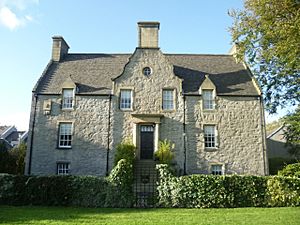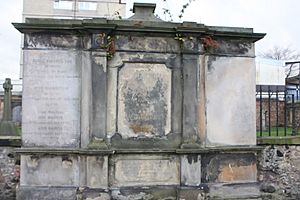James Balfour (philosopher) facts for kids
James Balfour of Pilrig (born August 20, 1705 – died March 6, 1795) was a Scottish lawyer and thinker. He was also a Justice of the Peace, which meant he helped keep law and order in his local area.
Life Story
James Balfour was born on August 20, 1705, at Pilrig House. This house was located between the towns of Leith and Edinburgh in Scotland. He was one of 16 children born to Louisa Hamilton and James Balfour. His father bought the Pilrig estate from another family who had lost their money in a big project called the Darien Expedition. Around the time James was born, his father built the Pilrig House we see today.
James studied law at the University of Edinburgh and the University of Leyden in the Netherlands. After finishing his studies, he became an advocate, which is a type of lawyer who speaks for people in court.
He held important positions, including treasurer for the group of lawyers he belonged to (the Faculty of Advocates). He also served as a local judge for Edinburgh. In 1754, he became a Professor of Moral Philosophy at the University of Edinburgh. This meant he taught students about right and wrong and how people should behave. Later, in 1764, he became a Professor of Public Law, teaching about laws that affect everyone.
James Balfour continued to live in Pilrig House, which he inherited after his father passed away.
He was very involved in golf! He was the Secretary for the Edinburgh Company of Golfers. He played at both the Edinburgh and Leith Golf Courses. In this role, he helped create the original rules of golf in 1777.
James Balfour died on March 6, 1795. He was buried in the churchyard of South Leith Parish Church.
His Ideas and Books
James Balfour wrote three important books about philosophy:
- A Delineation of the Nature and Obligation of Morality (published in 1753 and 1763). In this book, he discussed what morality is and why it's important. He also wrote about the ideas of another famous philosopher, David Hume.
- Philosophical Essays (published in 1768).
- Philosophical Dissertations (published in 1782). This was the first book he published under his own name.
In his writings, James Balfour believed that people find the most happiness by being good to others. He also thought that God approved of actions that led to the greatest happiness for everyone. He often debated the ideas of other philosophers like David Hume and Lord Kames, defending ideas about free will and action. He also disagreed with the idea that all our knowledge comes only from what we sense or experience.
His Family
In 1737, James Balfour married Cecilia Helen Elphinstone. They had one daughter, Mary Cecelia, and three sons: James, John, and Lewis. Their daughter Mary married William Gibson, and their son, James Gibson-Craig, later became a baronet (a special title of honor).
His brother, Robert Balfour, was a businessman in Leith. He ran a soap factory and operated a stagecoach service between Edinburgh and Leith.
James Balfour's mother was from the Hamilton family. His eldest sister married Gavin Hamilton, a bookseller and publisher in Edinburgh. Their son, Robert Hamilton, became a professor of mathematics and wrote a book about national debt. James Balfour also had great-grandsons who were notable: George William Balfour, a heart specialist, and James Balfour, a marine engineer in New Zealand.
James Balfour was the grandfather of Rev Lewis Balfour. He was also the great-great-grandfather of the famous writer Robert Louis Stevenson. In fact, Stevenson's full name was Robert Lewis Balfour Stevenson, showing a connection to his family's history.
His grandson, Elphinstone Balfour, worked as a bookseller on the Royal Mile in Edinburgh.
His granddaughter, Margaret Balfour, married Rev John Paul, who was a minister at St Cuthbert's Church, Edinburgh. He also became the leader of the General Assembly in 1847.
James Balfour's sister, Bridget Balfour, married Rev Neil McVicar, who was also a minister at St Cuthbert's Church, Edinburgh.
In 1750, his niece, Helen Balfour, married Rev Thomas Scott, a minister at South Leith Parish Church.
 | Sharif Bey |
 | Hale Woodruff |
 | Richmond Barthé |
 | Purvis Young |



